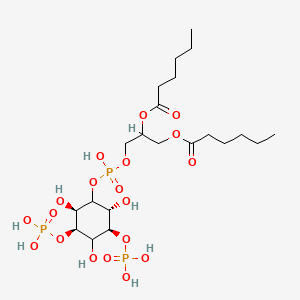|
Name: APINACA and AKB48 N-(1-Adamantyl)-1-pentyl-1H-indazole-3-carboxamide
Type: Synthetic cannabinoid
AKA: APINACA and AKB48

|
|
II. Natural Derivative
Synthetic substance, no natural derivative
 |

|
|
IV. History
APINACA and AKB48, synthetic cannabinoids, were first synthesized in the 2010s. They are part of a larger family of synthetic cannabinoids developed for their psychoactive effects. Their history reflects the challenges of regulating synthetic cannabinoids due to their potent effects and health risks.

|
|
V. Legal Information
APINACA and AKB48, synthetic cannabinoids, are often regulated under analog laws due to their psychoactive effects. In the US, they might be controlled under the Federal Analog Act if deemed similar to other controlled substances. Globally, their status reflects efforts to manage novel psychoactive substances.
US Federal Schedule - I
Schedule I drugs, substances, or chemicals are defined as drugs with no currently accepted medical use and a high potential for abuse. Some examples of Schedule I drugs are: heroin, lysergic acid diethylamide (LSD), marijuana (cannabis), 3,4-methylenedioxymethamphetamine (ecstasy), methaqualone, and peyote.
Key US Federal Policies:
Controlled Substances Act. Public Law: Public Law 91-513 (text can be found on GovInfo) (https://www.dea.gov/drug-information/csa). Date enacted: October 27, 1970.
|
|
VI. Physical Effects
APINACA and AKB48 are synthetic cannabinoids with potent psychoactive effects. As uppers, they induce euphoria and altered perception. Short-term effects include increased heart rate and potential anxiety, while long-term use may lead to psychological issues. Overdose risks involve severe agitation and cardiovascular problems. Safe use involves cautious dosing, and recent research emphasizes their potency and potential for misuse.  |
|
VII. Psychological Effects
APINACA and AKB48, synthetic cannabinoids, affect cannabinoid receptors, causing altered mood and perception. Immediate effects include euphoria and relaxation, while long-term use may lead to cognitive impairments and psychological issues. Research examines their potency, safety, and psychological impact.
 |
|
VIII. Culture
APINACA and AKB48 are synthetic cannabinoids with no historical or cultural lore, emerging in the early 21st century. Their cultural significance lies in their use as legal highs and the associated health and legal challenges. Proponents highlight their effects and legal status in certain regions, while opponents warn of health risks and unpredictable effects. Their use is primarily recreational, reflecting broader issues in synthetic drug regulation and public health.
 |
